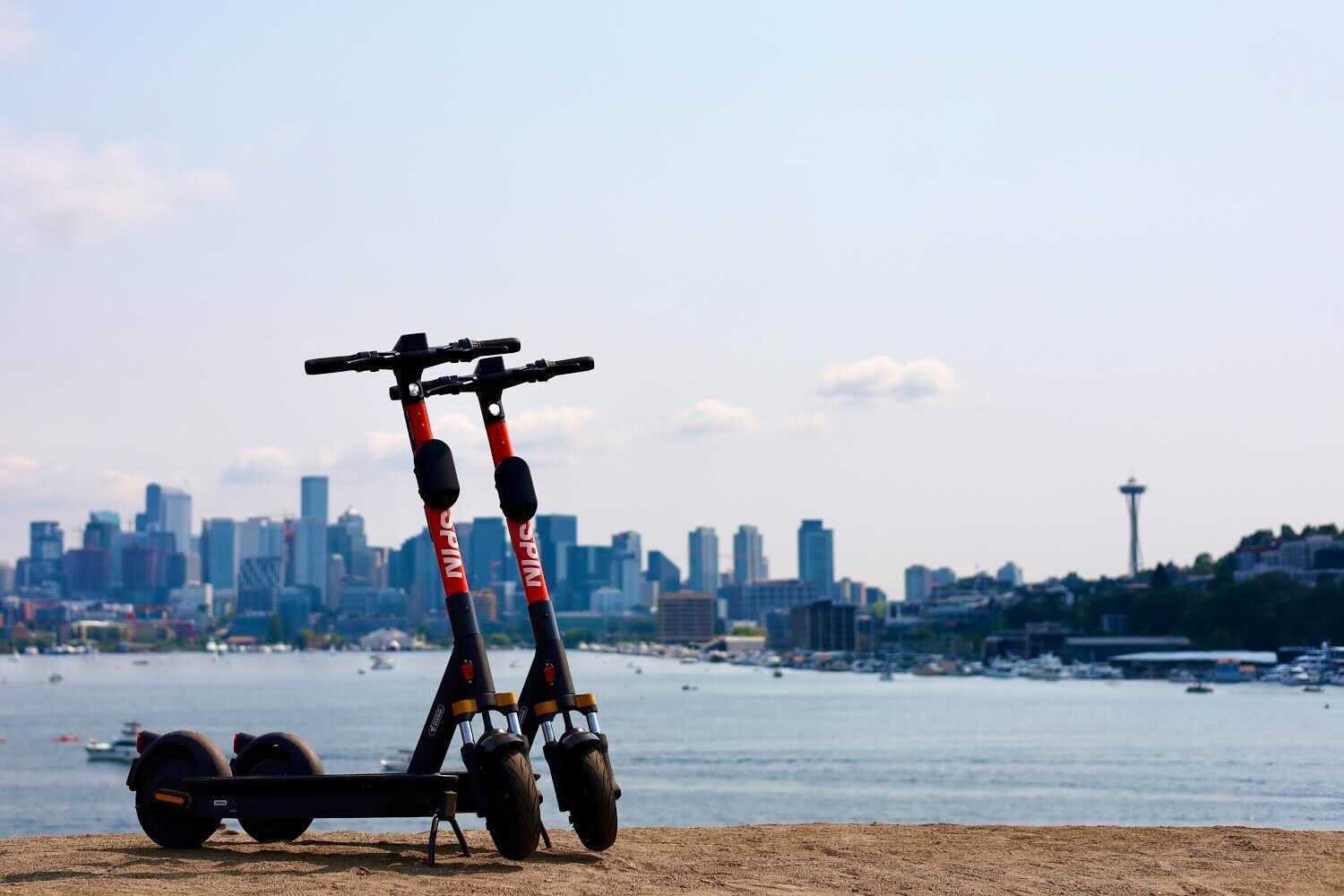 Photo courtesy of Spin.
Photo courtesy of Spin. Update [7/15/2021]: Spin has now been issued a permit and will start on July 15.
Last fall, we launched a scooter share pilot program aiming to give Seattle residents and visitors another healthy and climate friendly transportation option. Building on the program’s success, we have invited Spin to become the city’s fourth scooter share provider.
Spin is completing the permitting process and will likely receive a permit soon. The new fleet of vehicles are equipped with intelligent sensors to help encourage people to park scooters correctly and ride safely. We are also working with all four companies to test a new parking hub along West Seattle’s Alki Beach using GPS technology to address bad scooter and bike parking.
The scooter share program is very popular, with about 600,000 scooter rides since the start of the program. Ridership started out at about 5,000 trips a week in the fall and winter, then went up significantly with the warm weather, exceeding 30,000 trips per week in June.
We’ve also worked with scooter companies to make the program accessible to more people, with several programs offering free rides for people with low incomes, disabilities, and essential workers:
- As a requirement to operate in Seattle, all scooter companies have launched free or reduced-fare programs for people with low incomes. Anyone who is eligible for other income-based food, transit, rent or utility assistance programs can apply for the program on Spin’s, Lime’s, Link’s and Wheel’s websites.
- The scooter program funded our partnership with Outdoors for All giving free adaptive cycle rentals for people with disabilities all summer long. Outdoors for All has one of America’s largest adaptive cycle fleets with many different kinds of cycles built for people with specific needs, and is the only large-scale free rental program of its kind.
- Lime and Link also offered free rides to vaccine appointments and for essential workers in healthcare, food service, public safety, and public transit. Spin offers five free 30-minute rides each day for healthcare workers through their Everyday Heroes program.
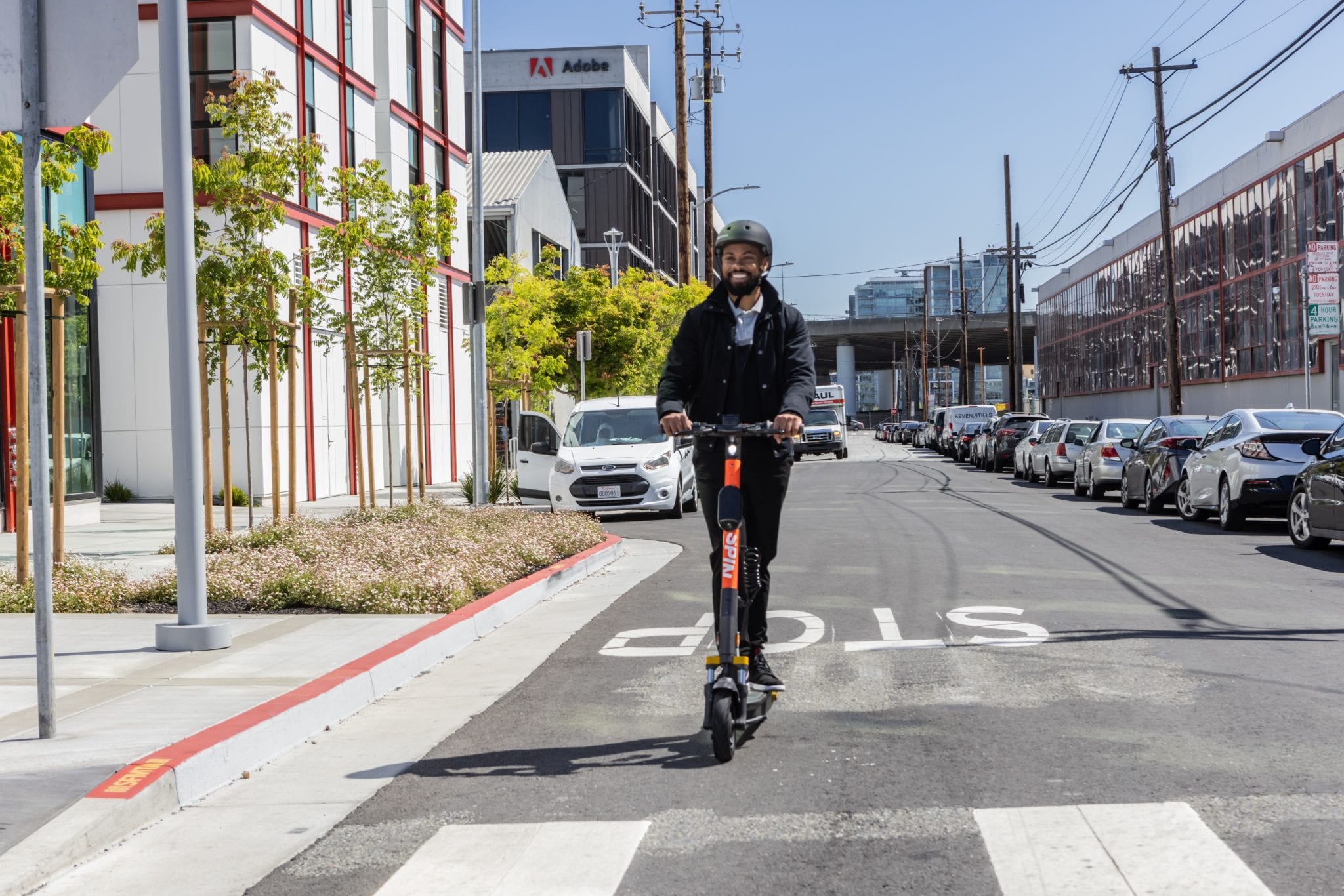
Spin will be bringing a new kind of scooter to Seattle, using technology to address parking and safety concerns.
When we launched our scooter share program last fall, we built in flexibility to respond to technological innovations and improvements. We expected that scooter companies would develop new ideas, so when we selected three scooter share companies to operate in Seattle we intentionally held off on issuing a fourth scooter share permit so that we would have the option to grow the program if another company came up with a creative new scooter design with new benefits.
As we predicted, scooter share companies continued to create new innovations. In April we announced we were accepting applications for a fourth scooter permit for companies offering new technology to improve on what is already available in Seattle.
Of the applications we received, Spin scored the highest and is in the permitting process to become Seattle’s fourth scooter share provider. Spin is a micromobility provider backed by Ford Motor Company which operates in many cities and universities in the U.S. and Europe, including in our neighboring community of White Center.
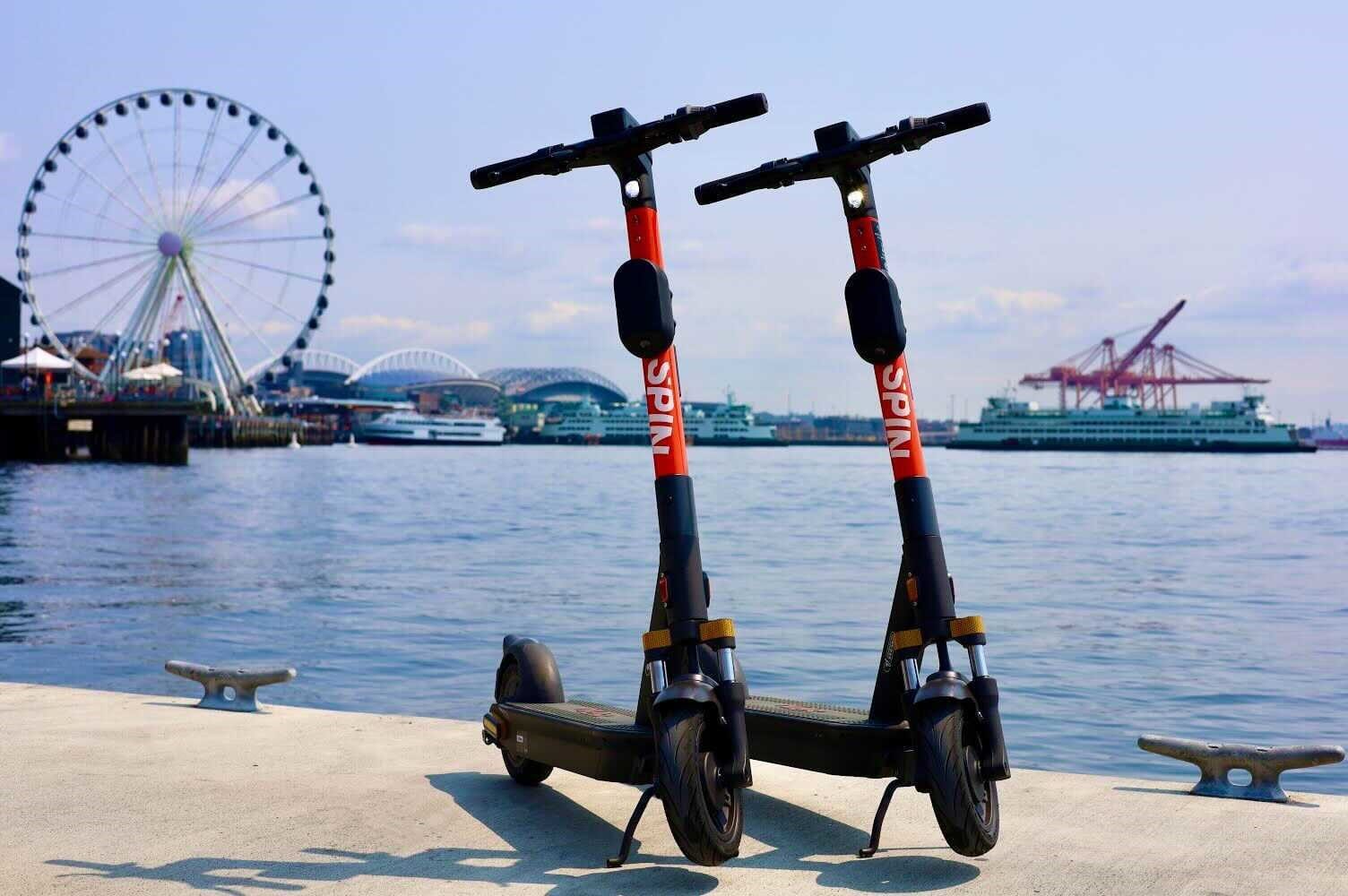
Spin will be equipping the scooters with new devices called Insight Level 2 which encourages better parking and riding behavior. Sensors and an on-board computer powered by Drover AI‘s machine learning and visual detection platform are installed on Spin’s new scooters. While Spin has tested this technology in other places, Seattle is the first major city where they are deploying this technology on their entire scooter fleet.
The system can also detect whether the device is traveling in the street, bike lanes, or on the sidewalk and make a sound to alert the rider and pedestrians when someone is riding on the sidewalk. The device speakers will encourage riders to safely exit the sidewalk, and in-app notifications will also inform them of the rules of the road. Spin is developing an algorithm to slow down devices on sidewalks and will work with SDOT to test this safety feature.
Similar to Seattle’s other scooter companies, Spin has a program called Spin Access which allows people without smartphones to rent a scooter and offers discounted rides for people with low incomes. Spin also offers five free 30-minute rides each day for healthcare workers through their Everyday Heroes program
Spin is completing the permitting process and will likely receive a permit soon. Spin will be authorized to operate up to 1,000 scooters, but expects to start off with a small fleet focused in West Seattle to help manage traffic while the West Seattle Bridge is closed and eventually expand to the rest of Seattle. Unlike other scooter companies, these scooters will be able to pass over Seattle’s border into White Center where Spin already has a permit.
“We applaud the work that SDOT is doing to expand alternative transit solutions that are safe and sustainable,” said Phuong Bui, Government Partnerships Manager at Spin. “We’re excited to return to Seattle and bring Spin Insight Level 2 powered by Drover as a way to create a safer experience for both e-scooter riders and pedestrians.”
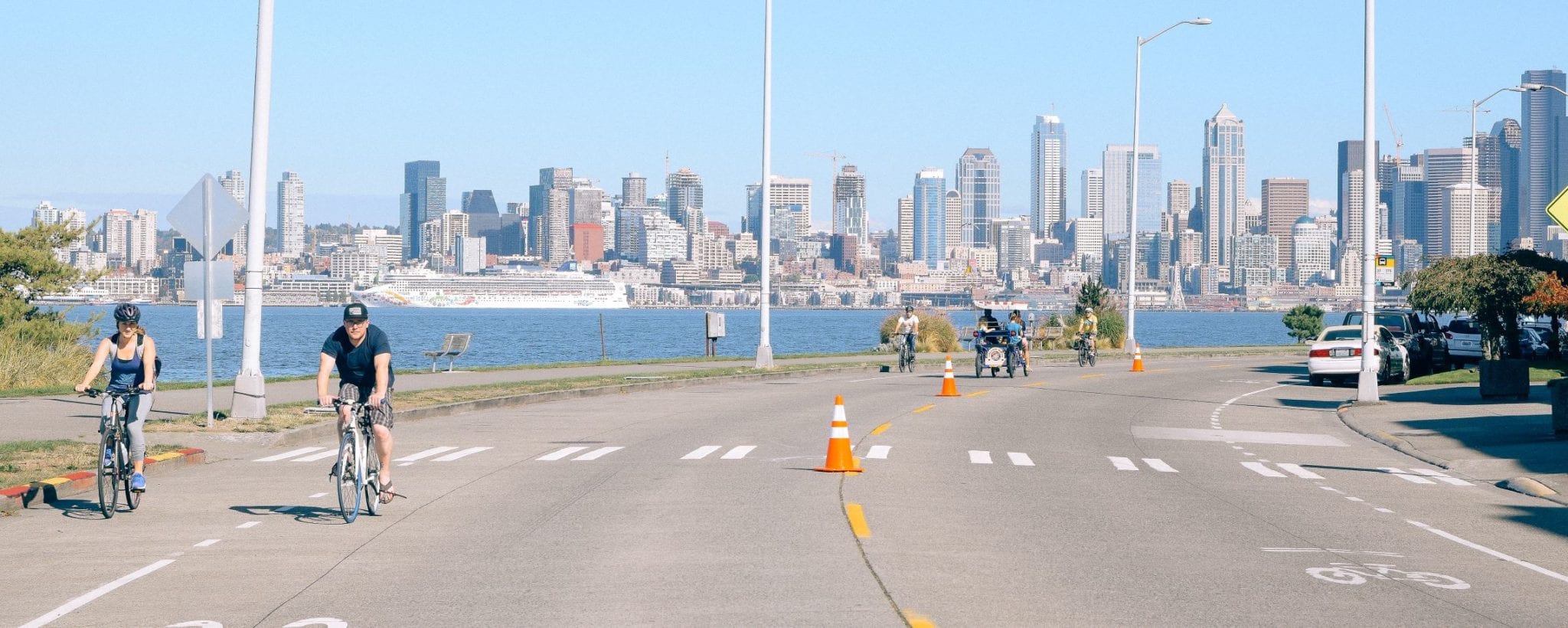
New parking rules on Alki Beach will help improve scooter parking
An ongoing challenge of the scooter and bike share program is educating people to park correctly and not block sidewalks creating barriers for people with disabilities or limited vision. To address parking issues we’ve installed 3,000 new bike and scooter parking spaces over the past five years, created videos to show people how to park correctly, required scooter companies to include clear instructions within their apps, and made it easier for people to report bad parking.
While these efforts led to improvements in parking behavior over time, we are still concerned about the number of incorrectly parked scooters and continue try new ways to ensure people get it right. Ultimately, for the scooter program to be a success it must make it easier for everyone to get around and not block sidewalks.
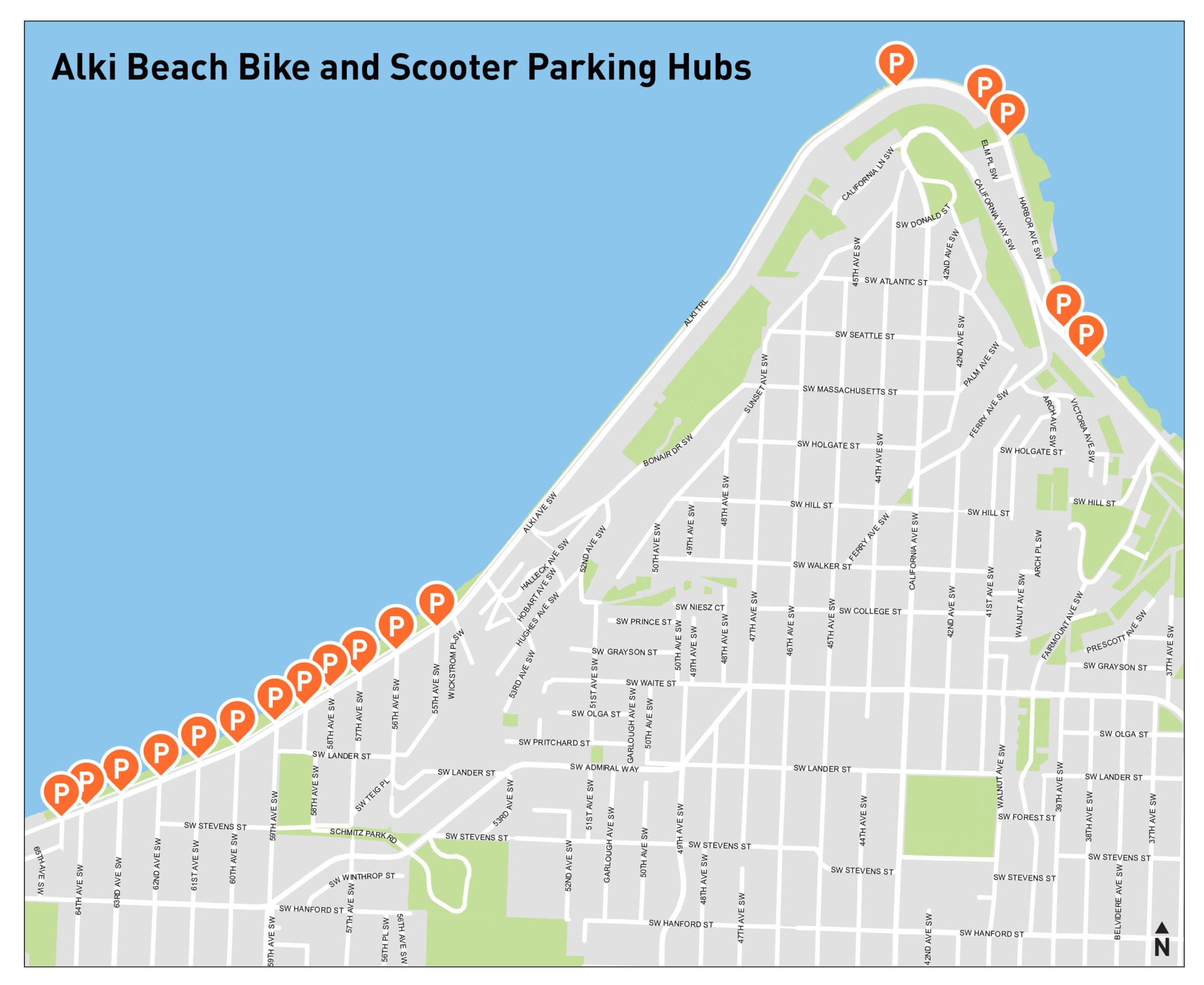
We’re testing a new strategy to improve parking in West Seattle. Over the past few weeks, several new bike and scooter parking spaces were painted along Alki Beach and near the King County Water Taxi dock. Starting this week, scooter and bike share companies will start using GPS technology requiring riders to park in these designated spots. If someone attempts to park on the sidewalk or sand, the app gives them instructions on where to move the scooter before the user can end their trip.
Several of these bike and scooter parking hubs are located on the street within “No Parking Within 30 Feet” zones near crosswalks, and new signs make it even more clear that it is illegal for cars to park there. This takes advantage of curb space that isn’t currently being used and helps keep the sidewalk clear so everyone can get around. It also enhances safety by preventing cars from parking illegally in a way that blocks other drivers view of oncoming traffic and people crossing the street.
We’ll observe how well the additional parking and technology works to prevent bad parking. If successful, then we can replicate the approach in other parts of Seattle with similar parking issues.

New scooter and bike share parking along Alki Ave SW 
New scooter and bike share parking along Alki Ave SW
New strategies like this and the intelligent sensors built into the new Spin scooters are good examples of how we are working to continually improve the program so it works better for everyone.
We hope to counterbalance enforcement mechanisms like fines, because we would rather prevent people from making a mistake then issue a penalty. Users who block a sidewalk are charged a $20 fee by the scooter companies (unless they are enrolled in one of the low-income discount programs), but we’re hopeful this new approach will keep Alki Beach visitors from getting a fine or finding their way blocked by an incorrectly parked bike or scooter.